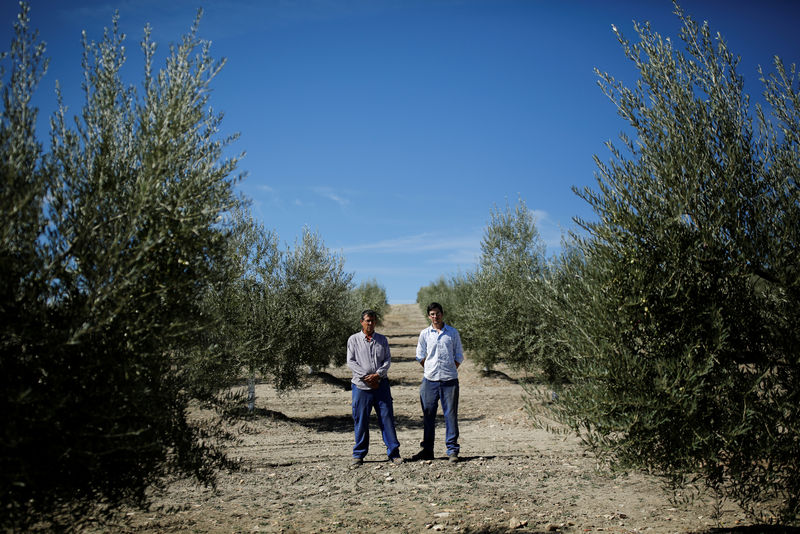By Elena Rodriguez
PORCUNA, Spain (Reuters) - A double whammy of U.S. import tariffs kicking in on Friday and a recent steep drop in global olive oil prices is threatening the subsistence of thousands of families in southern Spain who fully depend on "liquid gold", as the oil is known here.
The southern Andalusia region is home to the world's largest olive oil industry, accounting for about half the global output.
U.S. President Donald Trump's administration imposed 25% import tariffs on several European agricultural products, including Spanish olive oil, as part of WTO-authorized countermeasures in a long-running spat over subsidies to planemaker Airbus (PA:AIR).
"I don't get it why an agreement that politicians have with Airbus has to be paid by olive farmers. I just don't understand," 54-year-old Pablo Casado, who has grown olives for 40 years, told Reuters.
They start working in the groves before the sun rises so that the cool temperature preserves the olives' best properties. By hand or with the help of simple mechanical "combs", they shake the trees for hours, collecting tonnes of olives to then quickly transport them to the cooperative for pressing.
"In these 40 years, we have never had a situation like this ... The survival of the olive grove is in danger," Casado said, explaining that the price of extra virgin oil, of around two euros ($2.20) was already below his production cost of at least 2.4 euros.
On top of tariffs, olive oil prices have fallen 44% in the last year after a record harvest.
In his small town of Porcuna, most of the 7,000 inhabitants grow olives or make the oil sticking to traditional methods that confer a supreme quality to the end product. Most of the work is done by hand in the field and at the presses.
They are already immersed in the production of a premium oil made from the greenest olives before the main harvesting campaign starts in mid-November.
Casado said producers like himself were unable to compete with cheap imports or with big modern intensive plantations, so the tariffs could put him out of business.
The United States consumes 320,000 tonnes of olive oil annually or about half of all the non-EU consumption globally. Spain accounts for around 200,000 tonnes of American imports, including direct and indirect sales, the latter involving oil exported elsewhere in large containers and bottled abroad.
"Of the 60,000 tonnes of direct exports, we are talking about (losses worth) 400-500 million euros ($442-$552 million), but it is more than that and difficult to quantify," said Rafael Pico, head of the Spanish association of olive oil exporters.
Thousands of Andalusian producers converged on the capital city of Madrid last week to call for fairer prices, fearing the impact from U.S. tariffs that could also lead to Spanish imports being replaced by cheaper alternatives from Morocco and Tunisia.
"This is the work of several generations and is likely to die with me, but this is the reality," said Casado, whose son Sergio, 23, has returned to the farm after a two-year stint at a university.

"If the situation was bad enough, this is already a disaster ... The truth is that now it is very hard to carry on," he said, adding that he planned to "try to stay" in the countryside that he loves, but may have to seek other options.